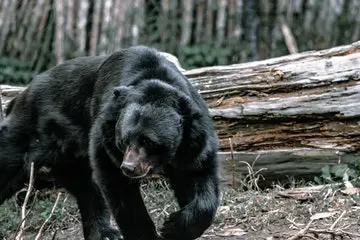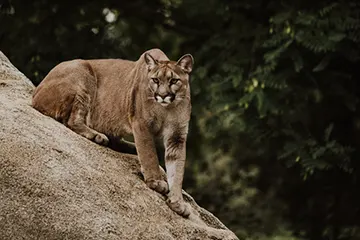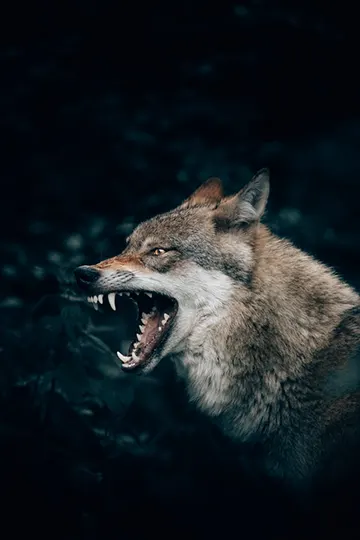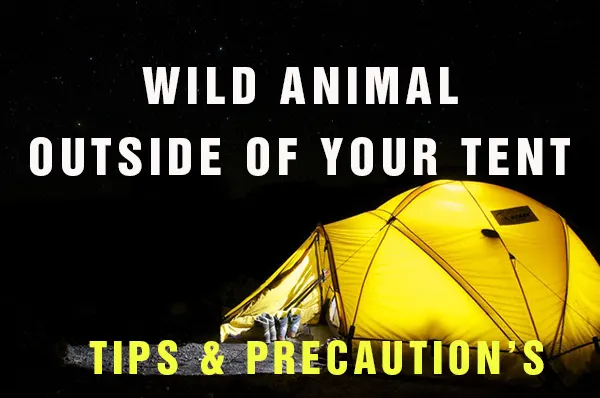There is no doubt in this fact that “camping is fun.” Camping is a great way to feel the sound of nature and get away from all the stress and mental illness.
But there are many other things too than just a weekend of fun. We have often heard about how people have been attached to wild animals. Whether it’s a Black Bear, Mountain Lion, Coyote, etc wandering outside of your tent.
The situation could be worst when you are camping with your friends and family and anyone might face this serious and terrifying situation.
So the question is…
What Should You Do If You Hear An Animal Outside Your Tent?
This is true that it’s not always possible to avoid a wild animal attack, but there are some tips and tricks to prepare yourself if you ever need to deal with a dangerous animal.
This article is all about how to identify the sounds of animals and take necessary precautions to avoid something terrifying happening.
Also Read: Best Backpack For Wild Camping in 2023[Latest Top Pick]
What To Do If You Hear An Animal Outside Your Tent! – A Guide For New Campers
Table of Contents
The first thing to do when you encounter an animal outside of your tent is to identify what type of animal it is. Some are omnivorous, carnivorous, and both. This will help you to take the necessary steps to handle the situation safely.
In this section, I’m going to share the different types of animals you may encounter outside your tent and how to handle them safely.
1. Black Bear Outside Tent:
Black Bears are most commonly found in the USA. If you want to see them you have to visit the woods and forests of the Midwest and the East Coast.

Sound Of Bear: “A bear can be heard by its deep grunting roar.”
How To Deal With A Black Bear Outside Of Your Tent?
Although Back Bears are rarely aggressive, their behavior is unpredictable. A recent case of a bear attack occurred at Rocky Mountain National Park where a female hiker was mauled by a black bear while walking along the Bear Lake Trail.
If you encounter a black bear just outside your tent then follow these steps to handle the situation and avoid the attack:
- Keep yourself calm.
- Try to roar and speak in a loud and clear voice to the bear.
- Make yourself appear bigger than the bear by spreading your arms.
- Try to wave your arms to scare the black bear.
- If shouting and waving don’t work, keep the stones, wood sticks, etc from the surroundings and throw them toward the black bear to scare it.
- If you don’t find anything around you and become unarmed then keep your hand at the front so that they are visible to the bear and slowly back away from the bear.
- If anything doesn’t work then try to make yourself as small as possible and crawl underneath your tent. Remain there unless or until the bear moves away from your tent.
If you feel that the black bear is now attacking you or appears to attack then try to yell for help.
Is A Tent Safe From A Bear?
A tent could be safe from a bear if it is properly installed, maintained, and used. A properly installed tent prevents a bear to get inside.
Also Read: How To Attach Tent To A Backpack 2023: Easy & Time-saving Tips
The mesh side of the tent is very effective to prevent a bear from climbing and keep away it from the tent. A tent that is used recklessly and without proper maintenance is not capable to stop a bear from entering the tent.
Additionally, if your tent is installed in an area where there are lots of bears, So the chances are quite high that bears may enter your tent.
2. Mountain Lion Outside Tent:
Mountain Lions, also known as Mountain Bison, are a type of bovine. They are native to the Rocky Mountains and the surrounding areas.

Mountain lions are known for being docile and friendly, but sometimes they can be aggressive. The aggressiveness of the Mountain Lion is due to its size. Their horns are very sharp and they can be dangerous to humans.
The sound made by Mountain loin: “Mountain lions make a soft, high-pitched cry. “
Do Mountain Lions Attack Tents?
We can’t say clearly that do they attack a tent or not. Mountain lions are known for their shyness and you will not see them often. But, anecdotal evidence shows that it is very rear that the Mountain lion attacks a tent.
What To Do If A Mountain Lion Is Outside Of My Tent?
If you’re camping in an area where mountain lions are present, be sure to follow these tips to avoid any potential conflicts:
- Stay calm inside your tent.
- If that’s not possible, try to make as much noise as possible so that the mountain lion feels threatened and backs away.
- Avoid making sudden movements, and keep your hands visible at all times.
- Make yourself as large as possible and make noise.
- If that doesn’t work, scream as loudly as you can and call for help.
If nothing scares Mountain Lion, try throwing stones, and pieces of wood from the surroundings at it. And, of course, never run!
3. Raccoons Outside Tent:
The Raccoon is a medium-sized animal that is most commonly found in North America. The raccoon is a mammal and its lifespan is around 2 to 3 years.

When Camping Outdoors Do Raccoons Attack Tents?
Mostly Raccoon is not aggressive animal. It is found that Raccoon is a timid animal and it attacks humans only if it feels threatened or to save their young.
What To Do If A Raccoon Outside Of My Tent?
There are a few things you can do to prevent raccoons from getting into your tent and attacking you.
- The first thing is to make sure that your tent is secure.
- Make sure that the poles of your tent are not leaning against a tree or other object, as this could be the cause of the raccoons coming into your tent.
- Make sure that you have a secure lock on your door and that your tent is set up on a flat surface.
- The next thing you should do is to take a look at your tent. If the roof of your tent has any holes in it, raccoons will be able to get into your tent.
- Another thing you should do is to keep food and drinks out of reach of the animals, as they will eat anything they can get their paws on.
- Finally, make sure that you don’t leave any trash lying around. If you do, raccoons will come and take your garbage for themselves.
4. Coyotes Outside The Tent:
The Coyote is a species of canid native to North America. They are about the size of a large dog, with a long tail and ears that point forward.

Coyotes are omnivorous and eat a variety of foods, including insects, small mammals, and fruits. Coyotes are solitary animals and are mainly active during the night or in cloudy weather.
Will Coyote Attacks Human In A Tent?
A coyote is a small and timid animal and attacking an adult human is very rear. Maybe it is curious about the food available inside of your tent or around your site.
The chances of attacking a coyote in a tent or an adult human are extremely rear. Humans are larger and wider than the coyote and it is afraid to attack prey larger than their own size.
What To Do If A Coyote Is Around My Tent At night?
Coyotes are unwilling to attack your tent or a human unless they found a delicious smell around your tent. Still, you have to take proper precautions to avoid any unwanted events when you are outdoors in your tent.
Step 1: Be aware of your surroundings: Coyotes can be very dangerous, so always be aware of your surroundings. You should not leave your tent unattended at night. Make sure there are no campfires or people near your tent.
Step 2: Keep your tent clean: You should make sure your tent is clean and organized. It’s important to keep your tent clean because it will help to reduce the chances of coyotes coming into your tent.
Step 3: Keep your food and garbage secured: Always make sure your food and garbage are stored securely. This will help to prevent coyotes from coming into your tent.
Step 4: Use a secure tent: Make sure you use a secure tent. Coyotes can easily enter a tent, so you should use a tent that is secure.
Some Safety Instructions, If Find Any Other Animal Outside Your Tent
Understanding the behavior of an animal is very important to handle the situation. It is very important to understand what animal wants and how to communicate with them.
Determine The Behavior OF Wild Animals
Steps to determine the behavior of wild animals:
Step 1: Check your surroundings: Look around your campsite for any wild animals that may be dangerous to you.
Step 2: Check for snakes: Snakes can be found in brush and trees. They’re usually not poisonous, but they can be very aggressive.
Step 3: Be aware of the size and type of animals: If you’re camping in a forest, you should be aware of the size and type of animals that are around you. If you’re camping in a city, you should be aware of the size and type of animals that are around you.
Step 4: Make noise if you see or hear something: If you do see or hear something, make sure to make some noise to scare it away. This is especially important if you’re camping near a lake, river, or stream.
Stay Calm
This is the very first step to tackling any wild animal outside your tent. Stay calm and take a deep breath to avoid nervousness.
A quiet and calm mind can think better than a nervous-minded person. In this way the chances of making the right life savior decision are high.
Find the Best Way To Respond
Don’t respond irrespectively to a wild animal. It may be hazardous. Here, are some safety tips to respond to a wind animal safely:
- Don’t try to touch them.
- Stay quiet and calm.
- Don’t try to use your flashlight.
Determine The Risk
Wild animal causes unpredictable injuries if you are careless. Although there are many risks from wild animals while camping outside, I’ve listed two major risks from wild animals:
- Diseases by them such as rabies, plague, and other life-threatening illness.
- Physical injury. You don’t want to be injured by a wild animal on your weekend trip.
(FAQ)
Q.1 How To Keep Animals Away From A Tent?
There are some steps that you can follow to keep animals away from your tent such as:
1. Choose The Right Place For Your Tent
Not every place is good for making tents. You have to avoid the below-listed places to make your tent such as water, wooden areas, rocky areas, leafy and fallen trees, Damp areas, Tall grasses, etc.
These places are heaven for snakes, insects, raccoons, bears, lions, etc. Choose a flat and open area for your tent installation. A place with very minimum or no grass could be an ideal choice for camping.
2. Use Some Chemical Substances
Some chemical substances such as garlic, sulfur, Ammonia, black pepper, citrus scent, etc are helpful to keep away some animals and insects such as bears, raccoons, snacks, mosquitos, rodents, etc from your tent.
3. Keep Your Food In a Safe Place
Keep your tent clean: You should make sure your tent is clean and organized. It’s important to keep your tent clean because it will help to reduce the chances of coyotes coming into your tent.
Keep your food and garbage secured: Always make sure your food and garbage are stored securely. This will help to prevent coyotes from coming into your tent.
Q.2 How To Avoid Being Attacked?
Follow these safety tips to avoid being attacked by a wild animal:
1. The best way to avoid being attacked by a wild animal is to not camp in an area where wild animals live.
2. Make a loud noise
3. Appear yourself bigger and wider than the wild animal.
4. Not to run and make any sudden movement.
5. Use some paper spray.
6. Use firearms.
Conclusion
I sincerely hope that you have found this article helpful and all the tips and safety instructions listed here, would be beneficial to you.
Never run or make sudden movements when you face a wild animal around your tent, follow the above-listed procedures to secure yourself from being attacked by a wild animal.


![Read more about the article Can I Carry A Gun While Hiking NY [Prohibited Things]](https://backpacksidea.com/wp-content/uploads/2022/06/can-i-carry-a-gun-while-hiking-in-NY.webp)
![Read more about the article Are Backpacks Better Than Purses:[Choose Wisely]](https://backpacksidea.com/wp-content/uploads/2022/01/purse-vs-backpack.webp)
